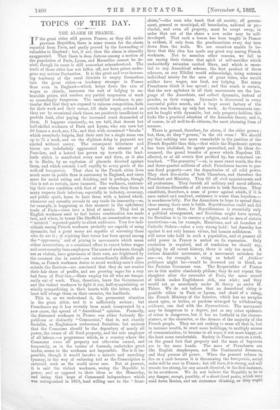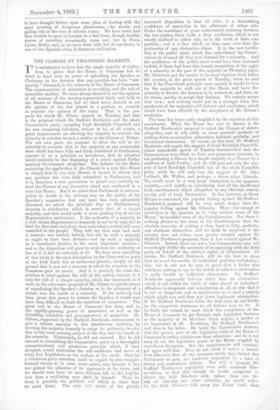TOPICS OF THE DAY.
THE ALARM IN FRANCE.
TF the great cities still govern France, as they did under previous Republics, there is some reason for the alarm reported from Paris, and partly proved by the forwarding of valuables to England ; but, if not, then the alarm is absurdly exaggerated. That there is deep distress among a section of the population of Paris, Lyons, and Marseilles cannot be de- nied, though its cause is still somewhat misunderstood. The trade of those cities has not fallen off, nor have prices under- gone any serious fluctuation. It is the great and ever-increas- ing tendency of the rural districts to empty themselves into the great cities—a tendency stronger in France than even in England—which keeps down the rate of wages so clobely, increases the cost of lodging to un- bearable prices, and renders any partial suspension of work so exceedingly dangerous. The unskilled workmen in par- ticular find that they are exposed to ruinous competition, both for their work and their rooms, till their wages, reduced as they are by occasional slack times, are positively insufficient to provide food, after paying the increased rents demanded of them. It happens constantly, we are told, that decent but half-skilled workmen of Paris and Lyons, who can earn but 20 francs a week, say, 17s., and that with occasional " breaks " which everybody forgets, find their rent for a single room run up to 7f. a week, and on the slightest delay in payment are ejected without mercy. The consequent bitterness and terror are indefinitely aggravated by the absence of a Poor-law, and a hatred has grown up towards the land- lords which is manifested every now and then, as it also is in Berlin, by an explosion of placards directed against them, and which extends itself rapidly to every grade of the
well-off bourgeoisie. That class in the French cities lives much more in public than is customary in England, and cares more for social eating and drinking, and is perhaps, though this is not so certain, more immoral. The workmen, contrast- ing their own condition with that of men whom they deem in many respects their inferiors, especially in industry, economy, and public spirit, learn to hate them with a hatred which, whenever any casualty reveals to any trade its insecurity—as, for example, is happening at this moment in the upholstery trade of Paris—rises into a kind of mania. They feel as English workmen used to feel before combination was made free, and when, in towns like Sheffield, an assassination was an "incident "reported quietly to silent audiences. Very few inch- viduals among French workmen probably are capable of using dynamite, but a great many are capable of screening those who do use it ; of rejoicing that terror has been spread among the "oppressors," and of joining in movements which mean either insurrection, or a combined effort to extort better wages and more security from employers. The mass of workmen, though not so violent, have grievances of their own, are frightened by the constant rise in rental—an extraordinarily difficult pro- blem, as French workmen desire to avoid working-men's cities outside the Barriers—are convinced that they do not receive their fair share of profits, and are growing eager for a very bad form of Poor.law,—State employ for all who are tempo- rarily out of work. They, therefore, leave the Government and the violent workmen to fight it out, half-sympathising or wholly sympathising in their hearts with the latter, who at least will avenge them on their enemies, the landlords.
This is, as we understand it, the permanent situation in the great cities, and it is sufficiently serious ; but Frenchmen say it has recently been much exasperated by a new cause, the spread of "Anarchical" opinion. Formerly, the distressed workman in France was either furiously Re- publican or distinctly " Communist," that is, not exactly Socialist, as Englishmen understand Socialism, but anxious that the Commune should be the depositary of nearly all power, the owner of all fixed property, and the sole employer of all labour,—a programme which, in a country where the Commune owns all property not otherwise owned, and frequently, as in the matter of funerals, undertakes great trades, seems to the workmen not impossible. Nor is it im- possible, though it would involve a minute and searching tyranny, in the way of enforcing toil as the Conscription is enforced, such as the world never saw. But at present, it is said the violent workmen, seeing the Republic in power, and as opposed to their ideas as the Monarchy, and losing that hope of Communal independence which 'was extinguished in 1870, lend willing ears to the "Anar-
chists,"—the men who teach that all society, all govern- ment, general or municipal, all boundaries, national or prc- vincial, and even all property, must be swept away, in order that out of the chaos a new order may be self- developed. That such a lesson has been taught in France is evident, if only from the proclamations every day torn down from the walls. We are ourselves unable to be- lieve that this idea has made any great way among French workmen. Not to mention other reasons, we fail to see among their virtues that spirit of self-sacrifice which undoubtedly animates excited Slays, and which is essen- tial to any Anarchical scheme, the first product of those schemes, as any Nihilist would acknowledge, being extreme individual misery for the men of great cities, who would- neither have wages, nor food, nor lodging. But many Frenchmen think it has spread ; and this much is certain, that the new agitators in all their movements use the lan- guage of the Anarchists, and collect dynamite, instead of . powder, as their weapon. Dynamite is discovered in every successful police search, and a large secret factory of the article was broken up only last week. As Governments can- not be fought with dynamite, but only property-holders, this looks like a practical adoption of the Anarchic theory, and is,. of course, to all well-to-do citizens, the most alarming form of' menace.
There is ground, therefore, for alarm, if the cities govern ; but, then, do they "govern," in the old sense ? We should say that nothing was more remarkable in the position of the French Republic than this,—that while the Napoleonic system. has been abolished, its agents proscribed, and its ideas de- nounced, the grand transfer of power which Napoleon IlL effected, or at all events first profited by, has remained un- touched. "The peasantry "—or, in more exact words, the five. and three-quarter millions of adult Frenchmen known to pos- sess fixed property—are the depositaries of all solid power. They elect five-sixths of both Chambers, and therefore the President and Ministry. They fill all civil appointments and all professions. They furnish all military and naval officers, and thirteen-fifteenths of all recruits in both Services. They constitute, therefore, a mass of power against which, if it ie ones united and resolved, resistance is worse than hopeless,— is murderous folly. For the Anarchists to hope to spread their ideas among these men is futile. Republicanism could and did spread among them, for Republicanism is essentially only a political arrangement, and Socialism might have spread, for Socialism is in its essence a religion, and on men of certain convictions—as, for example, Moravians, and all founders of Catholic Orders—takes a very strong hold ; but Anarchy has against it not only human virtue, but human selfishness. It will never take hold in such a population, and at present all solid power in France is united on its repression. Only resolution is required, and of resolution we should say, judging by all recent history, there is only too much. A serious Anarchic movement, or a movement mistaken for one—as, for example, a rising on behalf of Ateliers* publiques might be—would be drowned out in blood, as the Parisian Commune was. The Respeotables of France are in this matter absolutely pitiless; they do not repent the slaughter after the surrender of Paris, the mere record of which makes Englishmen sick, one whit ; and they would act .as mercilessly under M. Gre;vy as under M. Thiers. We do not believe that an Anarchical rising is. possible either in Paris or Lyons, and short of a rising,. the French Ministry of the Interior, which has no scruples about spies, or bribes, or pardons arranged by withdrawing evidence, can deal with the Dynamitaires. The movement may be dangerous in a degree, just as any other epidemic of crime is dangerous, but it has no foothold in the circum- stances, or the character, or the dreams of the majority of the French people. They are not seeking to erase all that is, but to increase wealth, to erect more buildings, to multiply means- of communication, to become in all ways, if not more happy, at
the least more comfortable. Society in France rests on a rock, on the grand fact that property and the mass of bayonets are in the same hands. The mass of Frenchmen are like English shopkeepers, not like Continental dreamers, and they possess all power. When the peasant refuses to
fire on a mob because it is threatening the b.ourvoisie, social
order will be over in France ; but till then, it is strong, and will remain too strong, for any assault directed, in the first instance, to its overthrow. We do not believe the Republic to be in any danger, except, possibly, of a short-lived panic, which may send down Rentes, and set statesmen thinking, as they ought
to have thought before, upon some plan of dealing with the most pressing of dangerous phenomena,—the steady and galling rise in the rent of inferior rooms. We have never had that trouble to meet in London in a bad form, though terrible stories of crowding occasionally come out; but in Paris, Lyons, Berlin, and, as we have been told, but do not know, in one or two Spanish cities, it threatens civilisation.



































 Previous page
Previous page